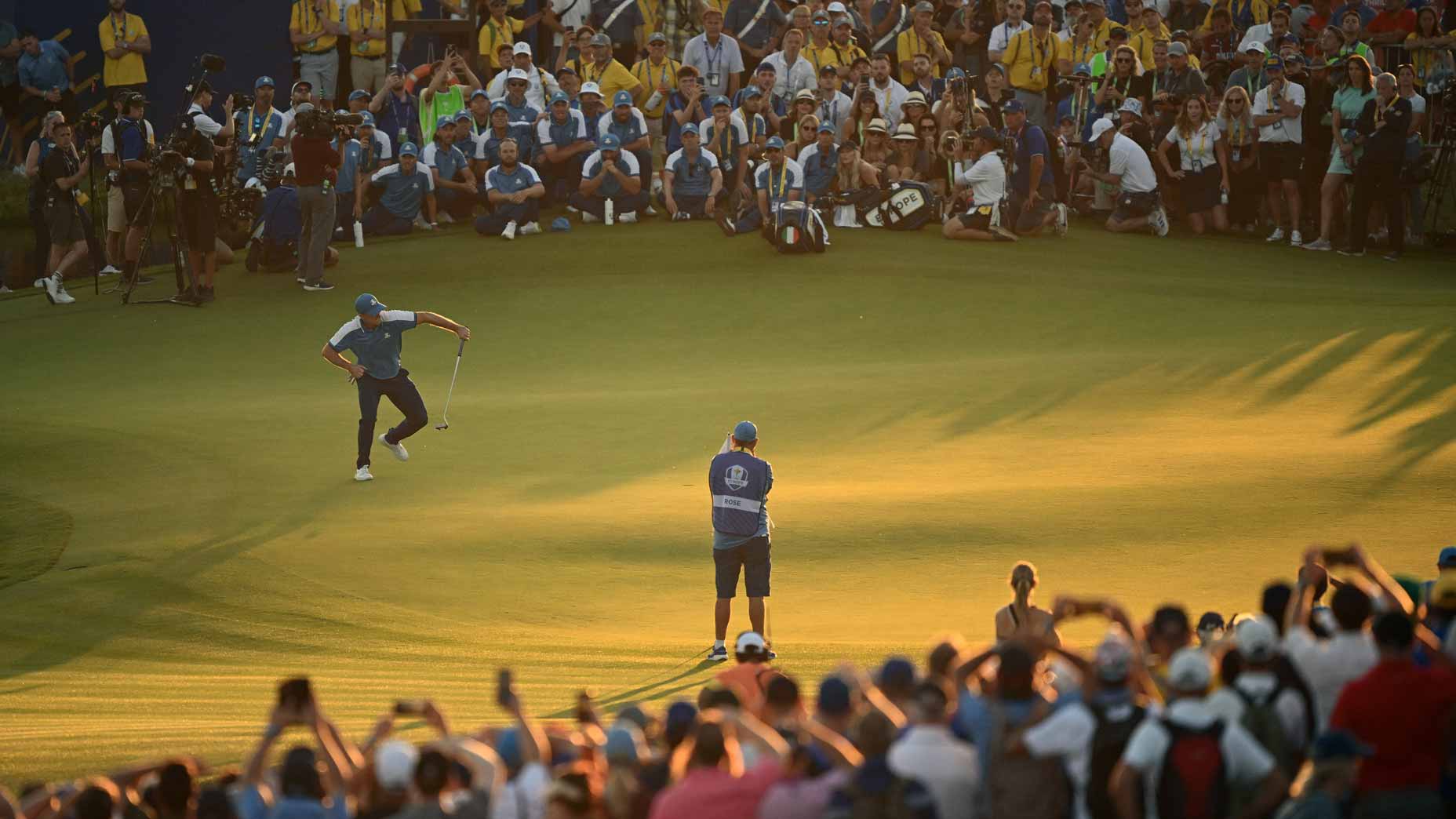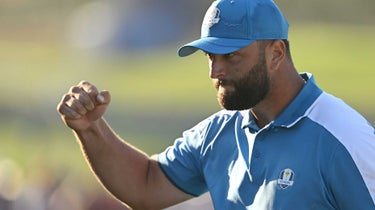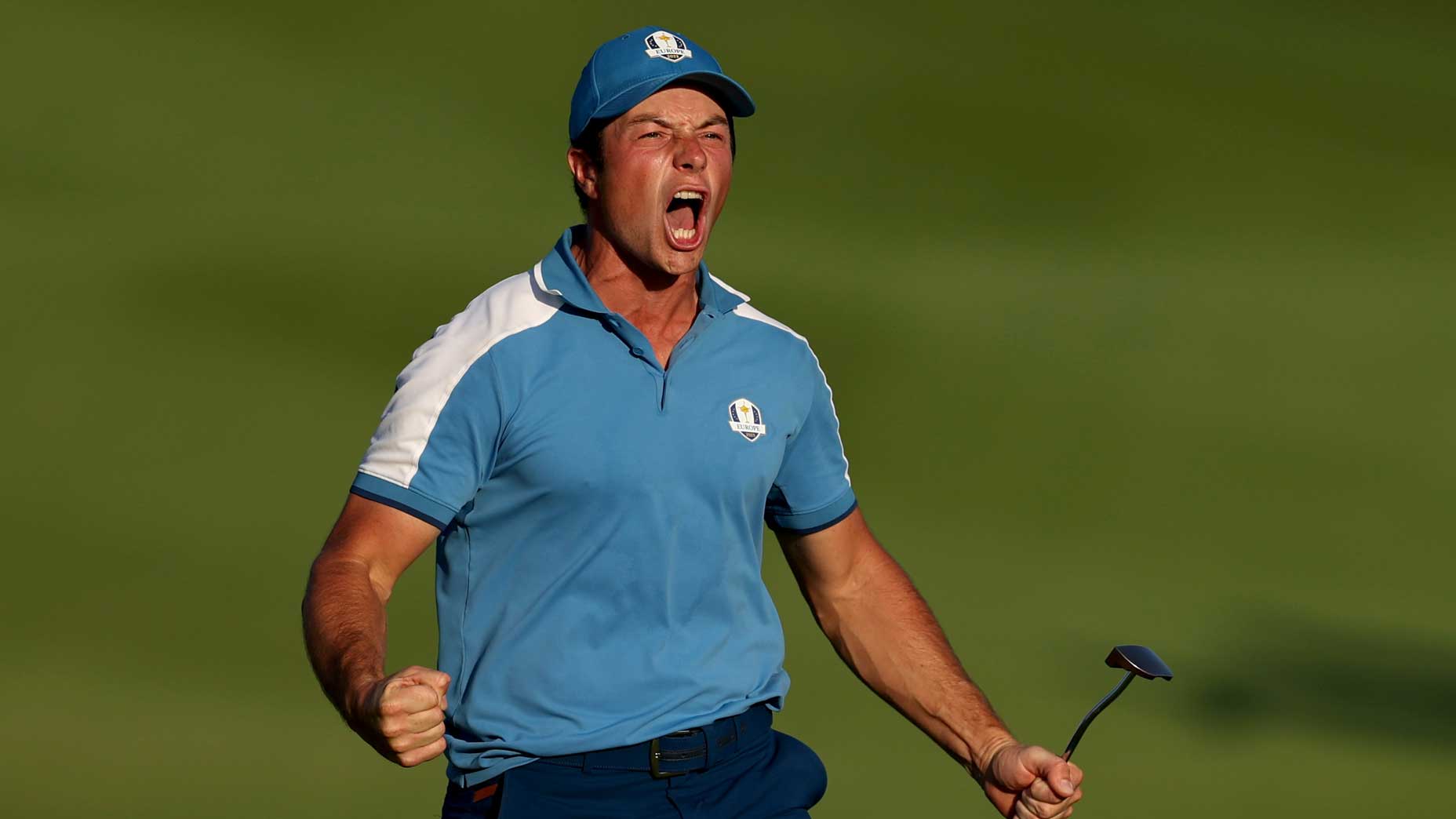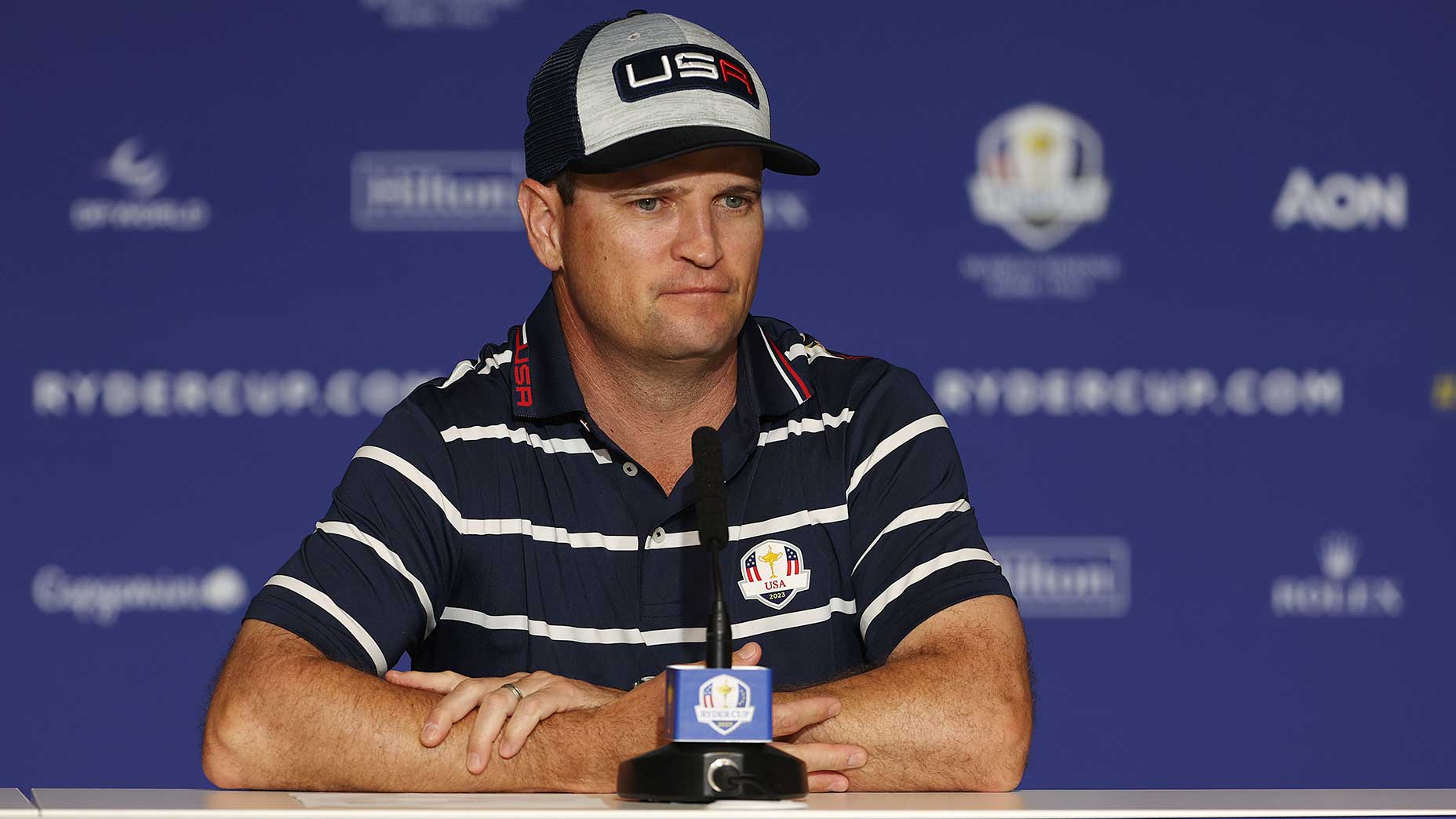
Justin Rose had a Ryder Cup moment — with his teammates looking on.
Getty Images
ROME — Justin Rose doesn’t belong on this European Ryder Cup team. Not really.
Take a look around Europe’s team room. There’s 22-year-old Danish basher Nicolai Hojgaard. There’s 23-year-old Swedish savant Ludvig Aberg. Its hottest player? That would be 26-year-old Viktor Hovland. This team’s future is also its present. And there’s 43-year-old Justin Rose.
Rose had already put a nice bow on his Ryder Cup career. He’d put together a terrific run for Team Europe, playing five of six Cups from 2008 through 2018. He’d compiled a neat 13-8-2 record, winning at a 50 percent clip in both four-ball and singles and battling to a heroic 7-2-1 in foursomes. And he was still among the best golfers in the world when he played at Le Golf National in 2018, where he went out on top by earning two points in a dominant team win.
ROSE’S GAME STARTED GOING SIDEWAYS in 2020. It wasn’t all bad. He still put together top 10s and occasionally contended. He’d just ceased to play golf at the level required to dine at the tables of golf’s elite few. When the time came to select a team for the 2021 Ryder Cup, two of Rose’s 40-something contemporaries — Sergio Garcia and Ian Poulter — got the call as captain’s picks. Rose didn’t. He watched as his European peers received a drubbing at Whistling Straits. From the outside it seemed particularly cruel that Rose wasn’t even able to join his teammates in bidding their farewell to a decade-plus of team dominance. But that wasn’t Rose’s reaction.
“When you do miss a team, it’s an opportunity to look inward and go, okay, well clearly I wasn’t valued enough or I wasn’t playing well enough, and I don’t like that feeling, so I need to do something about that,” he said earlier this week.
(And yeah, that’s how he talks; Rose tends to speak in a linear, logical fashion. His press conferences can overlap with his Morgan Stanley commercials. “In life and in business and everything, there’s obviously transition phases where you need to look to new leaders,” he said with regard to Team Europe’s turnover. He’s never had the effortless cool of teammates like Rory McIlroy or Tommy Fleetwood. It’s rare that he completely lets down his guard. But the former World No. 1 has never given up his self-belief, either.)
When LIV came calling, Rose was a logical target. When it came to European Ryder Cup stalwarts in their 40s, the controversial startup league seemed to be collecting ’em all. That included Poulter and Garcia. It included Lee Westwood, Henrik Stenson and Graeme McDowell, too. And it could have included Rose. It wasn’t until he’d declared his comeback with a win at the 2023 AT&T Pebble Beach Pro-Am that he explained why he’d made a different decision.
He’d heard the pitch. He admitted parts of it “sounded good on paper.” But he couldn’t shake the feeling that the reason he was playing professional golf was to contend in its biggest events — and he felt like he could still do so.
“Access to the major championships was a large part of my decision,” he said at the time. As for making a certain team in late September?
“I haven’t even entertained what the Ryder Cup looks like for me, other than I want to be there,” he added.
And here he is. Even Rose, who’s always been a tough nut to crack, acknowledged the emotions that came with the moment.
“From a 30,000-foot view, yeah, there’s a little bit more gratitude to the fact of being back,” he said. “A nod to the hard work that’s been done.”
ALL OF THE ABOVE brings us to Friday afternoon at Marco Simone Golf Club, some 15 miles outside Rome.
Rose must have been disappointed to sit for morning foursomes, given his sparkling record in the format. And when afternoon fourball teams were announced he was with Robert MacIntyre, by far the European team’s lowest-ranked player. They went off as the session’s biggest underdogs.
“I’ve never walked off a driving range before almost in tears,” MacIntyre admitted after the round. “I knew what was coming.”
That may not have inspired confidence, but impressively the lefty got off to a hot start with birdie at No. 1 to halve the hole. After Rose birdied No. 2, his teammate made par at No. 3, too, maintaining the duo’s 1 up lead. But that was it; for the final 15 holes the only holes where MacIntyre’s score beat Rose’s were those they lost, anyway. Surely the Cup’s oldest player couldn’t compete playing 1 vs. 2.
It felt inevitable when the lead began to disappear. Wyndham Clark won holes with birdies at 5, 7, and 9, giving the U.S. side a 2 up lead. Rose fought hard — he birdied 2, 6 and then 10-11-12 — but another Clark birdie at No. 13 pushed the lead back to 2 up. That’s where things stood going to No. 17.
Up ahead, the U.S. team was on the brink of victory in two consecutive matches before miraculous putts from Viktor Hovland and Jon Rahm sank their hopes on the 18th green. The U.S. side still hadn’t won a match.
“I said to my caddie, ‘Come on, I don’t want to be the only piece of red on that board,’” Rose said.
He needed some help and got it in the form of a team bogey for Clark and Homa at the par-3 17th. Then he split the fairway at No. 18 — only to watch his ball trickle and trickle until it just disappeared into the front edge of a fairway bunker.
What happened next served to clear the stage. Clark blew his approach way right and was soon out of the hole. Homa hit a strong approach but his birdie putt wandered just past the hole. MacIntyre was in for par. But now Rose faced a nine-footer in the final match of the day — with every teammate, opponent, fan, media member and tournament employee now ringing the green. Miss? The U.S. would have salvaged a tied 2-2 session and sit a reasonable four points back heading to Saturday. Make? Team Europe would have stolen the session and built the lead to five.
The putt broke ever so slightly right to left — and it was perfect from the moment it left his blade. By the time it settled at the middle of the bottom Rose had already unleashed a whirling fist pump in the direction of his teammates.
Then he started pointing at each of them in turn.
“I think it was you and you and you and you; that’s what I was saying,” Rose explained. “For all the boys. You know, just because everyone is in it together. I made the putt because I had 10 people willing it in behind me. Yeah, it’s for them, as well.”
If that sounds like the celebration of a top athlete crossed with an endearing dad, well, that checks out: both of Rose’s kids will soon be teenagers. But it was a putt that was as exhilarating for the European side as it was devastating for their opponents.
“I haven’t had many moments in Ryder Cups,” Rose said a few minutes after the putt dropped. “I’ve had points, but I haven’t had that many moments. Not in the afternoon in four-balls and had the whole team around. That was immense.”
Earlier in the week Rose said that he still felt like one of the boys. He felt like an integral part of the team. He didn’t feel like his age defined him. Although…
“I wish I was 10 years younger,” he admitted. “As we all do.”
But he spoke with admiration of the attitudes of his younger teammates.
“The youngsters do seem very self-assured, and that’s part of what they bring to the team, and you don’t want to talk them out of that,” he said. “They are experiencing everything for the first time, which I think is wonderful. They haven’t labeled everything yet.”
On Friday evening Rose experienced something for the first time, too. We’re happy to label it for him: it was the moment this Ryder Cup changed. And the putt meant more to everyone else knowing just what it meant to the man who struck it.










